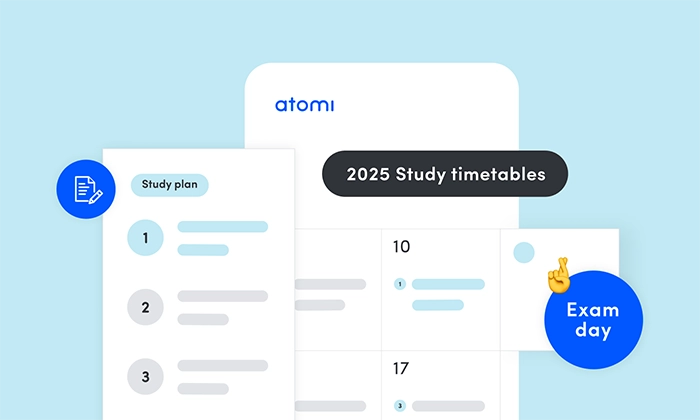Mnemonics: the magic memory trick

Do you struggle to remember everything you've studied? Well, five months from now, when you’re sitting in your HSC exam room during the nightmare that is reading time, you’re going to be so relieved that you read this post.
Welcome to Mnemonics 101.
Wait, what’s a mnemonic?
Great question.
Did you ever learn the colours of the rainbow through Roy. G. Biv (Red, Orange, Yellow, Green, Blue, Indigo, Violet)? That a mnemonic.
Did you ever learn the order of the planets in our solar system through My Very Educated Mother Just Served Us Nine Pizzas? (Mercury, Venus, Earth, Mars, Jupiter, Saturn, Uranus, Neptune, Pluto). That’s a mnemonic.
Remember learning the amount of days in each month with “30 days has September, April, June and November...”? Yeah, that’s a mnemonic too.
A mnemonic is basically a tool to help you memorise information you would normally struggle with. They can be acronyms, songs, rhymes, phrases or just anything that works!
When do I use them?
Well, you’re going to have a lot of subjects this year that need you to just memorise certain facts. It could be the quotes in your English essay, the characteristics of a megacity in Geography, the Five Pillars of Islam in Religion or the categories of crime in Legal Studies.
If you already have a pretty decent understanding of something and could list the Five Pillars of Islam in your sleep, then you obviously don’t need any memory tricks. But, if you are forgetting the key pieces of information over and over again, it’s time to create a mnemonic to help those facts stick in your brain.
Then, when you get into your exam, write the acronym or phrase onto your working paper or exam booklet so anytime you need that information for a question, it’s right there in front of you and you can nail your answer!
How do I make a killer mnemonic?
We made a little guide for you!
1. Pinpoint exactly what you need to remember
Is it a selection of quotes, the order of a group of facts or dates, a list of unfamiliar words? Don’t forget that you do need a pretty good understanding of the information, the mnemonic is just going to jog your memory!
2. Create the mnemonic
If you need to remember the order of something, a silly phrase is a pretty good option kind of like that planets one above.
We know it works in maths when it comes to trigonometry because we use SOH CAH TOA to remember how to get the sine, cosine and tangent of an angle. It’s not even using proper words but it rolls off the tongue pretty easily so it works! Feel free to be just as creative.


If you need to remember a bunch of factors, acronyms are your best friends.
Struggling with the character of Mega Cities in Geography? Well, just think: MEGAPOEM.

You’ll need to know what each point means, but the acronym will jog your memory and make sure you don’t leave any of the key points out.
3. Test the mnemonic out.
Close your books, close your laptops and put all your notes away. Get out a piece of paper and write only the mnemonic down on the page. If you can list all your quotes/facts off the top of your head with only that one mnemonic for reference - it’s checking out!
REMEMBER: If the effort of making and remembering the mnemonic is more than it would be to rote learn the information, then it’s time to ditch this strategy. Mnemonics are super useful but they just don’t ‘click’ for some people and they don’t work for every set of information so don’t worry about forcing a mnemonic if it’s just not happening for you.
Seriously though, how do I pronounce mnemonic?
We’ve got no clue. Who on earth thought it was okay to start a word with ‘mn-’??
(Okay, it’s actually pretty easy. It’s just a silent m).
Well, however you want to pronounce it, mnemonics are absolute lifesavers. You can be as creative and quirky as you like, the key is to just make sure they really work and that they’re helping you remember more content for your exams. Whether you borrow them from someone else or make up your own, it’s time to try out some of these bad boys and use them to dominate your HSC.
References
Subscribe to our newsletter
Get the latest teaching and learning insights delivered to your inbox.
You can unsubscribe at any time, no hard feelings.
Subscribe to our newsletter
Get the latest teaching and learning insights delivered to your inbox.
You can unsubscribe at any time, no hard feelings.
What's Atomi?
Easy to understand, super engaging, and matching what you’re learning in class. Available for 100s of subjects across your high school years.
With heaps of questions and smart AI feedback that shows you what you’ve nailed and what to work on—so you won’t just feel ready, you’ll be ready.
Improve your study game, get AI-driven tips tailored to you, keep tabs on your progress and unlock insights so you can always hit your goals.
What's Atomi?
Captivating and impactful video-first content, fit for all types of learners and grounded in the absolute must-have info of the high school curriculum.
Active recall quizzes, topic tests and exam practice enable students to get immediate feedback and build skills, while allowing teachers to differentiate instruction.
Create engaging learning experiences with easy-to-use tasks, get actionable insights to differentiate instruction and experience intelligent personalisation for your students.
What's Atomi?
Short, curriculum-specific videos and interactive content that’s easy to understand and backed by the latest research.
Active recall quizzes and practice sessions enable students to build their skills, put knowledge into practice and get feedback.
Our AI understands each student's progress and makes intelligent recommendations based on their strengths and weaknesses.




